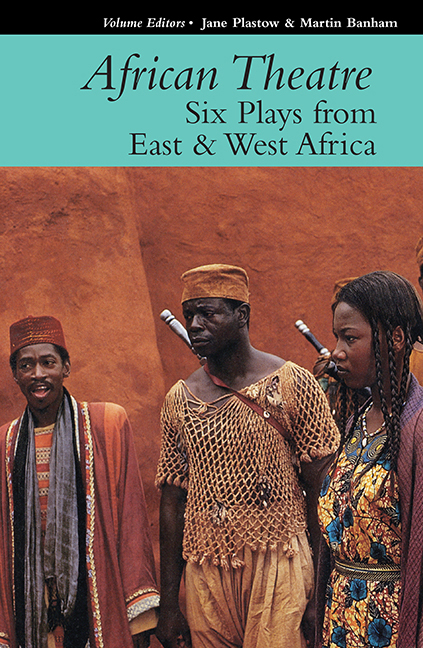Book contents
- Frontmatter
- Contents
- Notes on Contributors
- Obituary: Adieu Alain Ricard
- Preface
- THREE PLAYS FROM EAST AFRICA
- THREE PLAYS FROM WEST AFRICA
- Book Reviews
- Robert Mshengu Kavanagh, A Contended Space – The Theatre of Gibson Mtutuzeli Kente
- Edward Wilson-Lee, Adventures with the Ever-Living Poet: Shakespeare in Swahililand
- Francis Nii-Yartey, African Dance in Ghana: Contemporary Transformations
Edward Wilson-Lee, Adventures with the Ever-Living Poet: Shakespeare in Swahililand
from Book Reviews
Published online by Cambridge University Press: 24 August 2019
- Frontmatter
- Contents
- Notes on Contributors
- Obituary: Adieu Alain Ricard
- Preface
- THREE PLAYS FROM EAST AFRICA
- THREE PLAYS FROM WEST AFRICA
- Book Reviews
- Robert Mshengu Kavanagh, A Contended Space – The Theatre of Gibson Mtutuzeli Kente
- Edward Wilson-Lee, Adventures with the Ever-Living Poet: Shakespeare in Swahililand
- Francis Nii-Yartey, African Dance in Ghana: Contemporary Transformations
Summary
Edward Wilson-Lee was brought up in Kenya amongst conservationists and is now a Shakespeare scholar teaching at Cambridge. Shakespeare in Swahililand, a piece of popular scholarship telling stories of Shakespeare being read, adapted and performed across East Africa, is something of a bringing together of these two disparate worlds the author has inhabited. It is by no means an attempt at a comprehensive history, though it ranges in time from the 1850s and stories of Shakespeare-loving explorers, right up to a concluding discussion of the circumstances that led to newly independent South Sudan mounting a production of Cymbeline for the 2012 Globe to Globe festival in London – though strangely Wilson-Lee never actually tells us the year of that event. It is also not a piece of conventional scholarship in that, although he is of course dependent on literary sources for the Victorian period information, most of the time the book is more of a Shakespeareinflected travelogue, as Wilson-Lee tells us of his attempts to track down people and places involved with various Shakespearian productions. If you want to know about Shakespeare and East Africa this also means you have to plough through quite a lot of padding, with extensive musings on assorted Shakespeare characters, and descriptions of the places the author went to in the course of his research. Some of this is quite whimsical, and some definitely of tangential interest. I found myself skimming quite a lot of the flummery that brings the book up to 288 pages.
In a ‘Prelude’ that made my post-colonial Africanist soul twitch uneasily at the mention of ‘tribe’ and ‘a land … braved by white travellers’ (xi), I was then, as one interested in the history of theatre in Africa, rendered queasy when Wilson-Lee said he was looking for ‘the Holy Grail of Shakespeare Studies: an understanding of Shakespeare's universal appeal’ (xii). Surely scholarship has moved beyond ideas of a singular ‘universality’ in apprehending any cultural product. And surely Wilson-Lee must recognize that colonialism imposed the idea of Shakespearean exceptionality, and that the continued teaching of Shakespeare in certain African states says at least as much about colonized minds (See Ngugi's 1981 Decolonising the Mind) as it does about an Elizabethan playwright.
- Type
- Chapter
- Information
- African Theatre 16: Six Plays from East & West Africa , pp. 315 - 317Publisher: Boydell & BrewerPrint publication year: 2017

